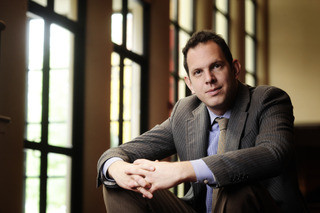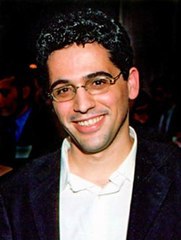|
Back
A Very Different State of Israel New York
SubCulture, 45 Bleeker St. with 92st. Y.
02/09/2015 -
Contact!: “New Music From Israel”:
Josef Bardanashvili: String Quartet No. 1: “Quasi Danza Macabra”
Yotam Haber: Estro Poetico-armonico II
Shulamit Ram: Mirage for five players
Avner Dorman: Jerusalem Mix (New York Premiere)
Musicians from the New York Philharmonic: Yoobin Son (Flute), Sherry Sylar (Oboe), Mark Nuccio (Clarinet), Alcides Rodriguez (Guest Clarinet), Kim Laskowski (Bassoon), Leelanee Sterrett (Horn), Michelle Kim, Shanshan Yao, Quan Ge (Violins), Rémi Pelletier (Viola), Nathan Vickery, Patrick Jee (Cellos), Eric Huebner (Piano), Helen Campo (Guest Bass Clarinet), Case Scaglione (Conductor)

Y. Haber (© Courtesy of the Artist)
What a travesty that our perception of Israel–blessed today with a disproportionate number of Davids, Solomons and Spinozas–should be shaped in America by thuggish tycoons, reactionary Evangelists and swaggering lobbyists. So in a world where corporate image-making is perceived as truth, we needed last night’s concert, where modern-day Davids allowed their inspirations to be played by the finer musicians of the New York Philharmonic.
The four results, from four leading Israeli composers, was anything but nationalistic breast-beating. Rather, from the playful, knowledgeable introductions by composer Yotam Harber, it seemed that musically, Israel is not so much a “Jewish state”, as a cosmopolitan state, with infinite ethnic, racial and religious congregation. And while I doubt that the flashy truculent politicians and lobbyists with agree with this, musically last night we heard an amalgam of Arabic, Georgian, Armenian and Jewish music in a multifaceted program.
Mr. Haber himself is unique both in upbringing–born in Holland, he has lived in Nigeria, Wisconsin, Israel, and presently New York–and he made a discovery which was rather astonishing. This, that Benedetto Marcello, that lyrical Venetian composer who Bach himself transcribed–was passionate about the Jewish music of 18th Century Italy.
Who knew?
While the humorous Mr. Haber doubts whether, as Marcello said, “God had given the music on Mount Sinai, to be passed onto His people”, he made good use of it in Estro-Poetic-armonico II, based on Marcello’s own “Harmonic works.” (Though historically, he had it wrong. Not Marcello but Vivaldi invented the form twelve years prior to Marcello.)
What Mr. Haber did with Marcello was intriguing. His unusual consort of violin, cello, alto flute, bass clarinet and piano, commenced with an apparent Marcello theme fluttering in the flute and bass clarinet, the music broadening out with intricate contrapuntal skill. Listening to this chamber music was intriguing enough, and we encountered amidst the musical puzzles, whispers of Marcello itself. It was a quodlibet sound of Hebraic themes, written (from the back row of a synagogue) by a curious Catholic, and now “translated” by this most cosmopolitan composer.
Adding a special spice was that it never seemed to end. Lots and lots of climaxes, but then the work continued with more invention, musical tricks. A total joy.
Actually, all the composers embraced that delicate line of being engaging and musically nimble. Take the case of Josef Bardanashvili, born of Jewish parents in Georgia, and the composer of a movement from a String Quartet called “Quasi Danza Macabra”. The dance was mainly a tango, and the tango rhythm was noted again and again by cellist Nathan Vickery. But if this tango was a connecting point, the whole movement exemplified pure energy. From the very first notes, nothing was ever diminished. One doubts that any of the strings had a single note of rest, plunging ahead with a variety of harmonies. Dissonant, consonant, playing against each other and together–but always that tango either returned or was part of the texture.
None of the four works was terribly difficult to hear (they were relatively short, the quartet of composers taking a little over an hour), but Pulitzer Prize-winning composer Shulamit Ran in her Mirage needed more attention. Again, we had a singular consort of violin, cello, clarinet, piano and alto flute/flute/piccolo played variously by Yoobin Son. Mirage itself was based on an arch-form of five blocks (shades of Bartók!), and the “mirage” according to Mr. Haber, was that the “climax” wasn’t where it was supposed to be.
Er...perhaps he was right. And I thoroughly enjoyed the continuous line from this very accomplished composer, especially the beautiful Middle Eastern opening. But the import of this climax never seemed very important to me. This was hardly a cold exercise, and was quite jolly at times. Yet I wasn’t especially interested in where it was going.

A. Dorman (© Courtesy of the Artist)
The final contribution was by Avner Dorman, who from my limited knowledge, is an Israeli Jacques Ibert. The first work I ever heard was a clever ethnic dance (I forget which ethnicity), then I heard his picturesque Astrolatry, a look at the heavens with huge orchestral vistas, tiny cymbals, violin harmonics and a Godly Dominion which didn’t defy imagery.
Like Ibert, Dorman’s orchestra is like a plaything, his vistas are international (think of Ibert’s “Tunis” from Ports of Call), and his music, from what I have heard, eschews depth for pure delight.
His Jerusalem Mix was pun of sorts. The Jerusalem Mix is a restaurant dish, made with offal, vegetables, spices and other stuff. Probably some kind of stew. But the five movements here became a mix of nationalities as well. The opening was like a 1950’s New York “white man’s jazz” overture, early Bernstein, rambunctious, jumping, fun especially for clarinetist Marc Nuccio. From there, he worked in a Jewish funeral lamentation (called The Wailing Wall), and my favorite, a klezmer Jewish wedding, with all the instruments blowing and bowing full blast. In the fourth movement, Adhan, the Muslim call to prayer was never quoted, but pianist Eric Huebner reached inside his instrument to imitate the oud, the apotheosis of Berber-Arabic music going back to the 14th Century.
I’ve rarely mentioned the musicians here. They are nearly all from the New York Philharmonic, so sui generis, they played their parts unfailingly well.
It was an intriguing night just for this unusual cosmopolitan music. Oswaldo Golijov is perhaps the most famous “international” Middle Eastern composer, his roots in South America, Medieval Christianity and the Judeo-Islamic tradition. And while the State of Israel is in a state of anxiety, due to its jingoistic neighbors and politicians, where the arts flourish, one can feel, almost apologetically, both optimism and veneration.
Harry Rolnick
|